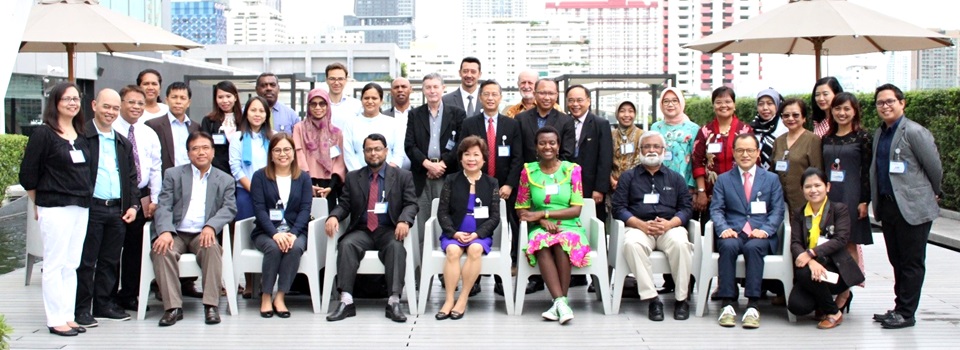The overarching framework in the identification of best practices is the New Extensionist—a global view of extension and advisory services (EAS) that reinvents and clearly articulates the role of EAS in the rapidly changing rural and agricultural context. It argues for an expanded role for EAS within agricultural innovation systems (AIS) and the development of new capacities at different levels to play this role (GFRAS 2013). The idea is to determine the extent to which programs and approaches have contributed to building the capacities of key EAS actors and stakeholders to actively meet the demands of the emerging innovation systems.
More specifically, the learning event and experience sharing aimed to share international experiences of best practices on AAS in the Asia and Pacific Islands Region, particularly focusing on best or innovative practices emanating from IFAD-funded projects in the three partner countries: Bangladesh, Fiji, and the Philippines. It also discussed key issues and concerns relating to AAS in order to create a platform for the institutionalization and wider application of the best practice approaches in future projects and programs. It also served as a forum for dialogue with potential donor partners and technical partners for project development and capacity building support.
A total of 37 participants composed of SAAS Project Partners; Sub-regional Networks in Asia and the Pacific; and Technical Institutions in Southeast Asia attended the two-day event.
Ms. Nancy M. Landicho, SEARCA Program Specialist and Officer-in-Charge of Project Development and Technical Services, opened the program by welcoming the participants on behalf of the Center. She highlighted that under its current Five-Year Plan, SEARCA has focused on resource-poor farmers and recognized the importance of passing to them information, best practices, new technologies, and the outputs of research so that they can be productive and able to provide, not only for their families, but also to their country and the region's growing population.
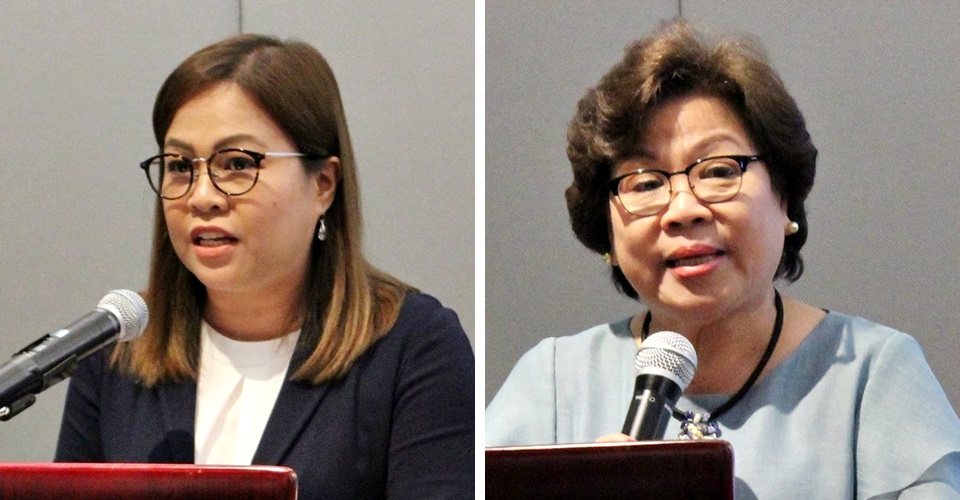 Ms. Nancy M. Landicho (left), Program Specialist and Officer-in-Charge for Project Development Technical Services, gave the welcome remarks on behalf of SEARCA. Dr. Virginia Cardenas (right), APIRAS Regional Coordinator, briefly discussed the objectives of the learning event and also recognized and introduced the participants during the opening program.
Ms. Nancy M. Landicho (left), Program Specialist and Officer-in-Charge for Project Development Technical Services, gave the welcome remarks on behalf of SEARCA. Dr. Virginia Cardenas (right), APIRAS Regional Coordinator, briefly discussed the objectives of the learning event and also recognized and introduced the participants during the opening program.
Ms. Landicho also expressed appreciation to IFAD for entrusting the project to SEARCA, which gives the Center the opportunity to be instrumental in strengthening capacities of institutions that coordinate rural advisory services at the national and regional levels.
Dr. Virginia R. Cardenas, Asia Pacific Islands Rural Advisory Services (APIRAS) Regional Coordinator, briefly discussed the objectives of the learning event and also warmly welcomed the delegates as she introduced them one by one.
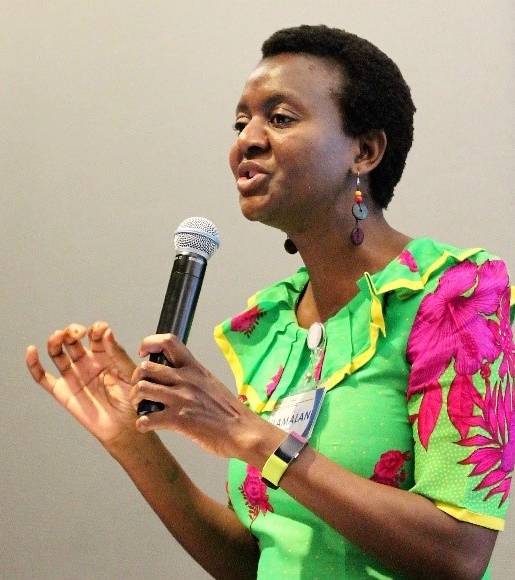 Ms. Hlamalani Ngwenya, Consultant of the Global Forum for Rural Advisory Services (GFRAS), presents the New Extension Learning Kit (NELK) Framework and Rural Advisory Services (RAS).The learning event started with the New Extension Learning Kit (NELK) Framework and Rural Advisory Services (RAS) presented by Ms. Hlamalani Ngwenya, Consultant of the Global Forum for Rural Advisory Services (GFRAS). The said NELK framework was used by all the presenters in showcasing their respective Best Practices.
Ms. Hlamalani Ngwenya, Consultant of the Global Forum for Rural Advisory Services (GFRAS), presents the New Extension Learning Kit (NELK) Framework and Rural Advisory Services (RAS).The learning event started with the New Extension Learning Kit (NELK) Framework and Rural Advisory Services (RAS) presented by Ms. Hlamalani Ngwenya, Consultant of the Global Forum for Rural Advisory Services (GFRAS). The said NELK framework was used by all the presenters in showcasing their respective Best Practices.
The resource persons for Day 1 and their respective presentations were the following:
- Dr. Rasheed Sulaiman, Director and Ms. Nimisha Mittal, Consultant, of the Centre for Research on Innovation and Science Policy (CRISP), presented the Best Practices in Agricultural Advisory Services: Cases from South Asia.
- Ms. Maramaniqali Elenoa Tamani, Research Associate for Partnerships and Policy of the Secretariat of the Pacific Community (SPC), and Mr. Kiniviliame Salabogi, President of the Fiji Kava Association - Fiji Crop and Livestock Council, presented the Institutionalizing Rural Advisory Services via Traditional Structure Community Centered Project.
- Dr. Md.SekenderAli, Secretary General of the Bangladesh Agricultural Extension Network (BAEN), presented the Second Crop Diversification Project: An Integrated Extension Approach for Rural Development.
- Ms. Czarina Pangket, Project Planning Officer of the Philippines Department of Agriculture – Regional Field Unit, presented the Participatory Approach: Heart of Cordillera Highland Agricultural Resource Management (CHARM) 2 Project.
- Dr. Botir Dosov, Chairperson of the CentralAsia and the Caucasus Forum on Rural Advisory Services (CAC-FRAS), presented the Mobile Apps for Farmers.
- Mr. Souvanthong Namvong, Deputy Director of the Department of Technical Extension and Agro-Processing (DTEAP) under the Ministry of Agriculture and Forestry of Lao PDR, presented the Best Practice: Farmer to Farmer Learning for Agroforestry.
These were followed by presentations for Day 2. The resource persons and their respective presentations were the following:
- Dr. Ha Thuy Hanh, Deputy Director General of the ASEAN Sectoral Working Group on Agriculture and Training Extension (AWGATE), presented Vietnam's Experience on Vocational Training and Technical Education for Farmers.
- Dr. Siti Amanah, Senior Lecturer at the Institute Pertanian Bogor, presented Cooperative Advisory Services to Strengthen Capacity of Smallholder Farmers towards Sustainability.
- Dr. Roy Murray-Prior, Junior Chief Editor of the Australasia-Pacific Extension Network (APEN), presented Greater Involvement of Smallholders in Modern Food and Fiber Markets: A Role for Rural Advisory Services.
- Dr. Song Yong-sup, Extension Specialist of the Rural Development Authority (RDA)-South Korea, presented the Good Practices in Agricultural Advisory Services inRepublic of Korea.
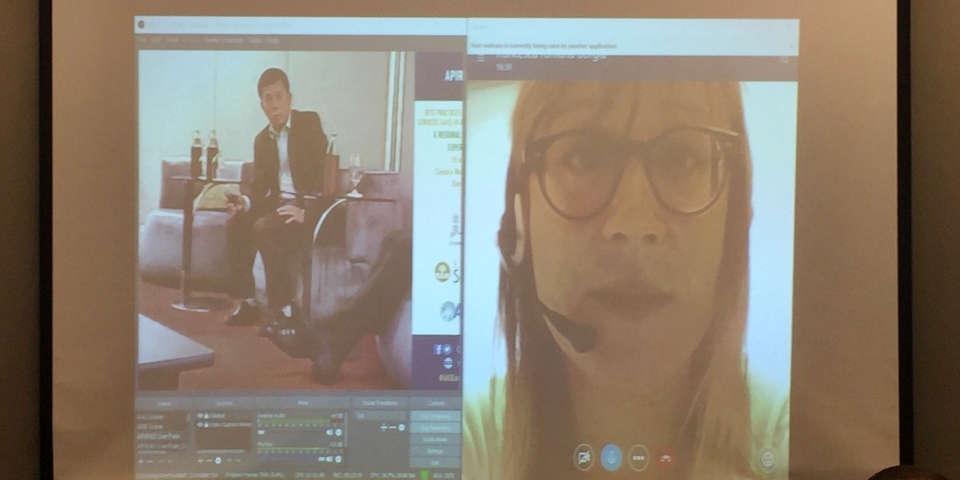 Ms. Francesca Borgia, Consultant for Institutions, Organizations, and Rural Youth under the Policy and Technical Advisory Division of IFAD, joined some of the sessions as well as the formal launching of APIRAS via livestream.
Ms. Francesca Borgia, Consultant for Institutions, Organizations, and Rural Youth under the Policy and Technical Advisory Division of IFAD, joined some of the sessions as well as the formal launching of APIRAS via livestream.
The learning event also gave way to the formal launching of APIRAS where Dr. Virginia R. Cardenas presented the organization's, Founding Charter. The members of the Steering Committee of APIRAS then gave their respective Complementary Remarks. Ms. Francesca Borgia, Consultant for Institutions, Organizations, and Rural Youth under the Policy and Technical Advisory Division of IFAD, also witnessed the formal launching and gave her congratulatory remarks to APIRAS via live stream.
The learning event concluded with Dr. Cardenas thanking the participants and SEARCA for a successful and fruitful event.
Dr. Filma C. Calalo, SAAS Regional Technical Coordinator, led the facilitation of the learning event. Along with Ms. Landicho, SEARCA was also represented by Ms. Imelda L. Batangantang, Program Specialist for Project Development and Technical Services.
The IFAD SAAS Project Management Office (PMO) is composed of Mr. Glen A. de Castro, Project Coordinator; Ms. Sarah Grace L. Quiñones, Project Associate; and Ms. Ana Kristina M. Aquino and Mr. Jerrel Edric B. Mallari, both Project Assistants.
The presentations of Best Practices on AAS will be published and distributed to Regional Networks as Knowledge Products. (Sarah Grace L. Quiñones)
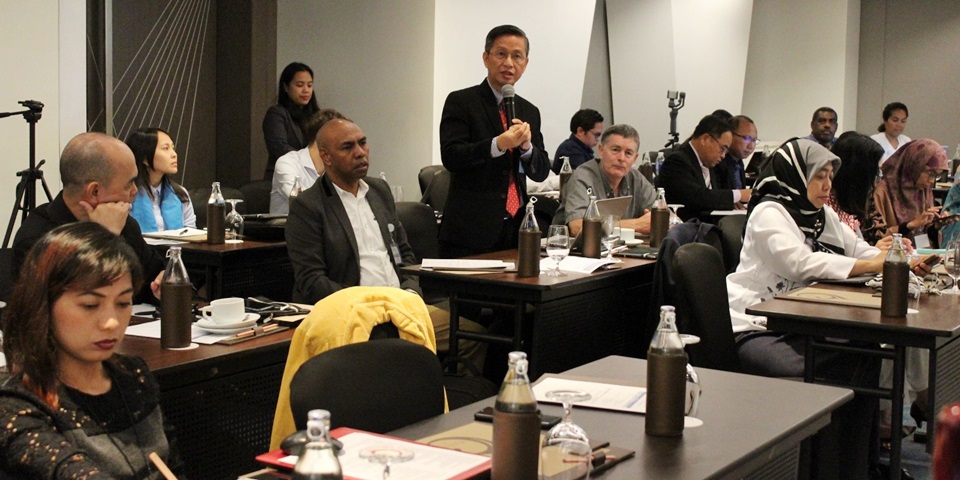 Dr. Jesus C. Fernandez, SEAMEO BIOTROP Deputy Director for Programme, posed some questions during the open forum.
Dr. Jesus C. Fernandez, SEAMEO BIOTROP Deputy Director for Programme, posed some questions during the open forum.

